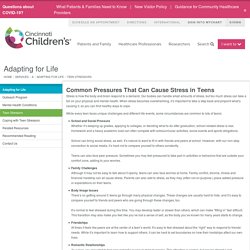

Shankar2016. How to help children and teens manage their stress. In the short term, stress can push a child to practice for her piano recital or inspire a teen to study when he’d rather be out with friends.

But chronic stress is different. Left unchecked, long-term stress can contribute to a long list of physical and mental health problems. Prolonged stress can cause high blood pressure, weaken the immune system and contribute to diseases such as obesity and heart disease. It can also lead to mental health problems such as anxiety and depression—disorders that are becoming more common in youth. In a 2018 study, researchers analyzed data from the National Survey of Mental Health and found that rates of anxiety and depression had increased in kids ages 6 to 17, from 5.4% in 2003 to 8.4% in 2011-12.
Stress in young people doesn’t always look like stress in adults. Sources of stress in young children For young children, tension at home is a common source of stress. School is another frequent source of concern for kids. Suicide Awareness and Prevention. Stress is how the body and brain respond to a demand.

Our bodies can handle small amounts of stress, but too much stress can take a toll on your physical and mental health. When stress becomes overwhelming, it’s important to take a step back and pinpoint what’s causing it, so you can find healthy ways to cope. While every teen faces unique challenges and different life events, some circumstances are common to lots of teens: School and Social Pressure Whether it’s keeping up grades, applying to colleges, or deciding what to do after graduation, school-related stress is real. Homework and a heavy academic load can often compete with extracurricular activities, social events and sports obligations.School can bring social stress, as well. Stress (for Teens) - Nemours KidsHealth. Feeling like there are too many pressures and demands on you?

Losing sleep worrying about tests and schoolwork? Eating on the run because your schedule is just too busy? You're not alone. Everyone feels stressed out at times — adults, teens, and even kids. But you can avoid getting too stressed out by handling everyday pressures and problems, staying calm, asking for help when you need it, and making time to relax.
What Is Stress? Stress is a response to pressure or threat. The stress response is also called the fight-or-flight-response. But a situation doesn't have to be physically dangerous to activate the stress response. Even in these situations (which are hardly life-or-death), the stress response activates to help you perform well under pressure. Psychology Today Singapore. Teens are under more stress today than ever before.

Sound like an exaggeration? Despite the fact that I am often prone to hyperbole, consider this: being a teenager is not easy. Adolescence has always been a tricky developmental period defined by fundamental yet somewhat difficult changes (physical, cognitive, and social) experienced by teens as they make their way from childhood toward adulthood. These transitions trigger changes in the way the teen sees him/herself, and the way that others see and treat him or her. They are no longer children, but not yet adults, and this series of transitions not only has an impact on the individual experiencing the transitions, but also on parents, peers, and society as a whole. article continues after advertisement Adolescence has always been an awkward stage where teens struggle to build their own identity, seek autonomy, and learn about intimacy and sexuality in relationships. So, why are teens so “angsty” today? What can parents do? Adolescent20stress.
Suicide Awareness and Prevention. If you’re feeling stressed or overwhelmed, don’t be afraid to talk to a friend or a trusted adult.

You can also find ways to tackle stress on your own. Here are some tips for keeping stress under control: Remember You’re Not Alone Everyone struggles with stress, but they don’t always talk about it. Remember that it’s normal not to feel normal. If you are feeling overwhelmed, reach out to someone you trust and talk about what’s causing you stress. Even with these coping tips, you may still find yourself in challenging and stressful situations. Personal plan handout.